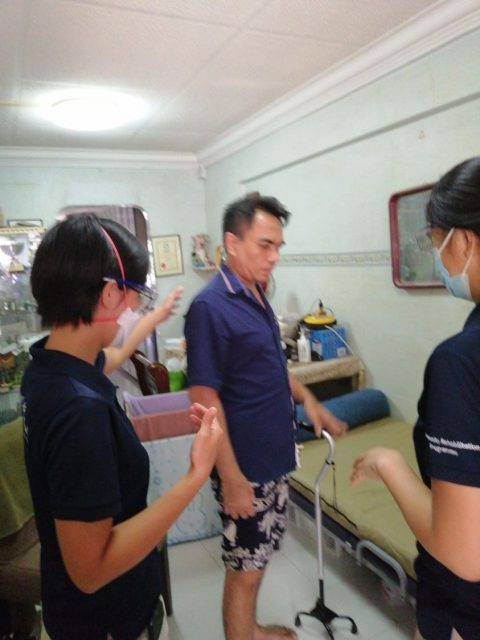PPP Chairman only gets physiotherapy support for stroke 3 months after discharge from hospital

People’s Power Party Chairman Chairman, Syafarin Sarif, took to Facebook to say he only got the physiotherapy support he needed 3 months after being discharged from hospital.

Syafarin Sarif, the Chairman of People’s Power Party informed his friends and well-wishers in October last year that he was discharged from hospital after getting a stroke. Syafarin, 45, said that his party chief Goh Meng Seng and others have helped him in his recovery and recuperation process.
He took to Facebook in late January to say that he has not been getting physiotherapy care after his discharge from hospital for stroke for about 3 months. He said that he checked with Agency for Integrated Care (AIC) and SATA Commhealth for any available space for physiotherapy treatment but was repeatedly told to wait.
He recounted how he was only assigned a physiotherapist when he informed his doctor on 22 December that he has not had physiotherapy care since his discharge on 16 September last year. He asked if his specialist doctor had forgotten that he needed physiotherapy care.
According to World Health Organization (WHO), a stroke is caused by the interruption of the blood supply to the brain, usually because a blood vessel bursts or is blocked by a clot. This cuts off the supply of oxygen and nutrients, causing damage to the brain tissue. A stroke patient often incurs massive damage to their brain cells. They lose their ability to perform various functions on their own. Physiotherapy for stroke is one of the most effective cures.
Stroke can cause certain weakness. It also can trigger partial or complete paralysis, which is known as hemiplegia. This makes it difficult or sometimes impossible for the patient to move his/her limbs.
The balance and the posture of the patients get disrupted and that is why, along with other medicines, therapeutic help and physiotherapy support is also necessary.
Physiotherapy support is indispensable in curing a stroke patient is immense.
Most importantly, the physiotherapy sessions aimed at the recovery of these patients, are focused on strengthening their limbs and enabling them to make movements again. This not only helps them (the patients) to regain strength but also at the same time, it helps them to gain back their confidence.
There are a number of ways by which home based physiotherapy support can actually benefit stroke patients recover faster. A study conducted by Leigh Hale in the year 2013, shows that there are a number of ways by which home based stroke rehabilitation and physiotherapy treatment of patients help them recover quickly when compared to the hospital based treatment.
One of the major advantages enjoyed by home based physiotherapy patients is that they do not have to travel in order to go to the outpatient service provider. For that reason, the patients need to rely on some family member or hospital supported transportation systems to avail the physiotherapy.
On the other hand, home based stroke patients do not need to travel. The study showed that a stroke patient receiving home physiotherapy, enjoyed more emotional support than those going to hospitals.
The patients who have received home-based physiotherapy were able to be more open about their problems. This helped them to recover faster as they were to start thinking of getting out of bed and start walking earlier than the patients who received physiotherapy at the hospitals.
Enjoying this article?
Subscribe to get more stories like this delivered to your inbox.
Home-based physiotherapy for stroke patients allowed them to stay in touch with their family members. Availing physiotherapy at home makes it possible for them to get that support. Home physiotherapy is mostly aims at making the patient active as soon as possible.
In 2016, the PPP Chairman said that it is better to die than seek medical help in Singapore. He said his friends from Malaysia and China paid a flat fee of 30 Singapore cents and 20 Singapore dollars respectively for hospitalisaton in their home countries whereas patients in Singapore are saddled with heavy medical expenses, and how sometimes it even follows them after death.
The Government however assures that it is committed to keep healthcare affordable and to help needy patients with their medical bills. Healthcare is kept affordable for Singaporeans through heavy government subsidies, supplemented by the Medisave, MediShield, Medifund and ElderShield framework.
Contributing writer at The Independent News
